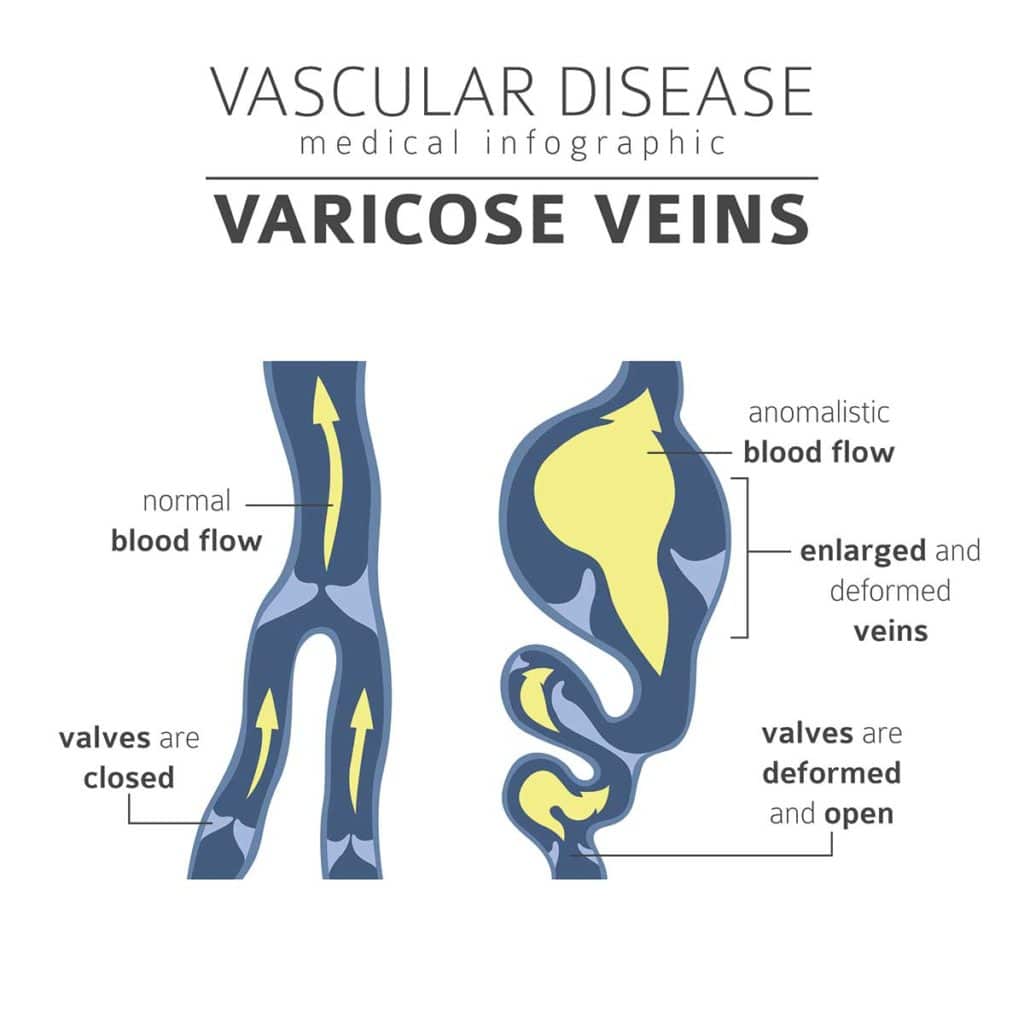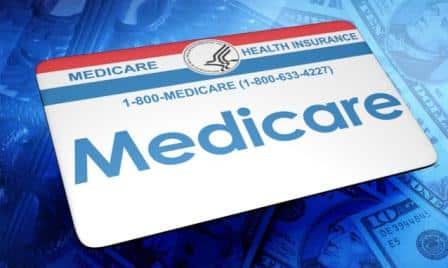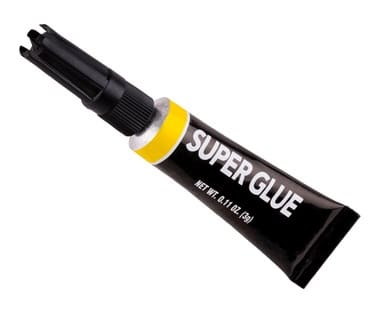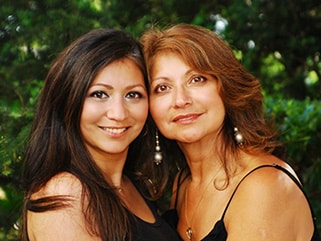Common Symptoms of CVI – Should you be concerned?

The concern about having or developing Chronic Venous Insufficiency (CVI) is a great reason to have your varicose veins fully assessed by a qualified Vein Specialist.
Why should I be concerned about the symptoms of Chronic Veins Insufficiency?
Chronic Venous Insufficiency, also known as Venous Reflux Disease or Venous Stasis, refers to a condition of inadequate blood flow from the legs back to the heart. In healthy veins, blood pressure and muscle movement move blood out of the legs and upwards; one-way valves prevent back-flow of blood between heart beats. When those valves become weak, veins become distended and blood pools in the lower legs. This can lead to Chronic Venous Insufficiency. While CVI is not usually lethal, its symptoms can significantly diminish your quality of life.
What are the most common symptoms of Chronic Venous Insufficiency?
If you experience any of these symptoms, consider getting a full vascular health evaluation from a qualified Vein Specialist to determine what can be done to improve your quality of life.
- Varicose and spider veins
- Swelling of the legs and ankles
- Skin color changes over the legs and ankles
- Sores on the legs (ulcers), especially those that are slow to heal
- Aching legs
- Heavy legs
- Burning, throbbing in the legs
- Muscle cramps
- Leg fatigue
- Bleeding veins
- Itching over veins
- Restless legs
- Leg pain after sitting or standing long periods
Who is at risk of developing the symptoms of Chronic Venous Insufficiency?
There are a number of reasons that venous valves become weaker, and family history tops the list. If other members of your family have CVI, you have a much higher chance of developing this condition. Other factors include:
- Age. Vessel walls get weaker over time.
- Hormonal factors. Hormonal imbalances and fluctuations affect vessel wall integrity.
- Pregnancy. Hormonal fluctuations and the physical pressures of pregnancy are both factors.
- Trauma and other injury to the legs. Scar tissue can also impair blood flow.
- Deep Vein Thrombosis. These are clots that form in the deep venous system and impede blood flow.
There are lifestyle factors, as well, that can increase your chances of developing CVI. Any repeated activity (or inactivity) that impedes or slows blood movement in the body will impair your vascular health, including:
- Standing or sitting for long periods. Gravity can take a toll, and blood moves better when the body is moving.
- Obesity. It takes a lot of physical resources to support increased fat tissue.
- Smoking. Not only does smoking decrease the amount of oxygen that is taken in by the body, its long-term effects include a buildup of plaque and decreased flexibility in the vessel walls.
- Hypertension. High blood pressure can also contribute to a decrease in blood vessel wall flexibility.
- Lack of physical activity. Blood moves better when the body is moving.
Treatment for the symptoms
While there is no cure, there are a number of minimally invasive procedures available that will improve vascular sufficiency, and provide relief from CVI symptoms. Read more about them by clicking on the links.
- Medical Adhesive (Veneseal Closure System)
- Laser Treatment (Endovenous Laser Treatment (EVLT)
- Radio Frequency Ablation (ClosureFast Radiofrequency Procedure)
- Liquid Sclerotherapy and Compression (chemical injection)
A board certified Vein Specialist can provide you with a full vascular exam and Duplex Ultrasound.These tools will measure the blood flow returning to the heart, assess your overall vein health, and allow for the creation of a treatment plan tailored to your specific needs.
Question & Answer 5 weeks post-EVLT, veins along my inner thigh have turned brown, and one spot is slightly red. Is this normal? Question: It’s my 1st week in Vietnam and I’m here for an additional two-and-a-half weeks. My doctor closed up a vein in my groin area 5 weeks ago. I’ve just noticed on…
Read MoreQuestion: I am 20 years old with a history of undiagnosed autoimmune disease, which is currently in an acute flare. After suffering from a case of phlebitis in greater saphenous vein of the right leg for two months, I was just recently diagnosed with venous insufficiency in both the greater and smaller saphenous veins of…
Read MoreQ & A Pregunta: ¿Qué cubre el seguro, estoy en Medicare con un suplemento. Respuesta: Medicare con un suplemento cubre las visitas a la oficina, los ultrasonidos y las intervenciones necesarias, típicamente al 100%. Por lo general, no hay un gasto de bolsillo asociado con el tratamiento en la oficina.
Read MoreQ & A Question: What do insurance cover, I am on Medicare with a supplement. Answer: Medicare with a supplement covers the office visits, necessary ultrasounds and interventions, typically at 100%. Usually there is not an out of pocket expense associated with in-office treatment.
Read MoreQ & A Pregunta: ¿Cuál es el costo promedio si tiene varices en una pierna y arañas vasculares en la otra? Respuesta: la mayoría del tratamiento de las venas varicosas, si es médicamente necesario, está cubierto por el seguro. Los costes del tratamiento de la vena de la araña varían dependiendo de la cantidad de…
Read MoreQ & A Question: What is the average cost if you have varicose veins in one leg and spider veins in the other? Answer: Most varicose vein treatment, if medically necessary, is covered by insurance. Spider vein treatment costs vary depending on the amount of veins present, if the insurance will cover them (medically necessary) and…
Read MoreVenaSeal El último tratamiento para las varices puede parecer que es directamente de una película de ciencia ficción, pero la sustancia utilizada para cerrar las venas anormales, pegamento del cianocrilato, se ha utilizado en procedimientos médicos y cirugías por décadas. ¡ Créalo o no, el pegamento del cianocrilato se ha utilizado los procedimientos desde 1949,…
Read MoreVenaSeal The latest treatment for varicose veins may seem like it is straight out of a science fiction movie, but the substance used to close off abnormal veins, cyanoacrylate adhesive, has been used in medical procedures and surgeries for decades. Believe it or not, cyanoacrylate adhesive has been used procedures since 1949, and other types…
Read MoreAlgunos buenos consejos generales fueron recientemente compartidos por el Consejo de salud de Estados Unidos sobre varices y arañas vasculares. Hay algunos puntos adicionales que deben ser considerados cuando se discute la salud venosa. Con respecto a lo que hay que recordar; es importante mantener una hidratación adecuada. Al hacerlo, se fomentará un flujo sanguíneo…
Read MoreSome good general advice was recently shared by U.S. News Health Tip regarding varicose and spider veins. There are a few additional points that should be considered when discussing venous health. Regarding do’s and don’ts to remember; it is important to maintain adequate hydration. In doing so, one will encourage healthy adequate blood flow thereby…
Read More






